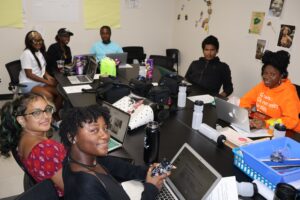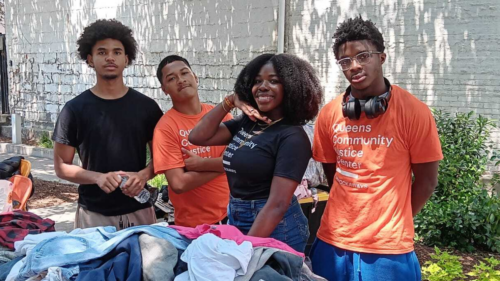Everyone deserves meaningful opportunities to make a stable living. For our teams across the city, that raises a critical question: What does it look like to build economic justice from the ground up?
This summer, hundreds of young people are making their way to our sites across New York City to gain experience as community organizers, multimedia artists, cultural ambassadors, and creative problem-solvers.
They’re all part of the city’s Summer Youth Employment Program, which gives young New Yorkers a chance to explore their talents and interests while receiving paid work experience. Across the city at our community-based locations, we’re opening our doors to help develop young people’s skills, prepare them for future education and jobs, and provide critical income for them and their families—for school supplies, food, and basic needs over the summer.
Crime, poverty, and structural racism are deeply interconnected. An integral part of our approach to creating equitable and safe communities is providing mobility out of poverty and access to opportunity.
Economic justice is the foundation on which healthy communities are built. Access to economic opportunities is crucial to stability in all other aspects of life: housing, physical and mental health care, family well-being, even a sense of purpose and meaning. Yet employment discrimination, inequalities in education and other public services, and a long history of disinvestment have cut off access to many such opportunities in marginalized communities.
Addressing those systemic harms is no small task. It starts with the long-overdue work of investing in the communities most impacted by economic inequality. That’s why we offer residents across the five boroughs career guidance, resume coaching, help with work certifications, job interview training, and more.
As part of their work with the Summer Youth Employment Program, our teams are helping young people break into jobs that not only pay well and afford stability, but that are also personally and socially meaningful. In Far Rockaway, our Queens Community Justice Center is bringing 20 young people together to organize a Culture Day event, highlighting and celebrating the many cultures—Haitian, Dominican, Trinidadian, Guyanese, and more—that have left their mark on the neighborhood. Young interns also gained experience in the social service sector, handing out hygiene supplies, clothing, and other essential items to the community. The Queens Community Justice Center team in Jamaica, Queens, facilitated a youth-led oral history project where young people built their skills as photographers, documentarians, and interviewers to spotlight local leaders from their community.

Summer Youth Employment Program interns at our Queens Community Justice Center.
“Working with the youth this summer has been a great experience,” said Wesley Thompson, who helps oversee the Community Justice Center in Jamaica. “Aside from the economic justice benefits, the most meaningful part has been hearing from young people that they specifically chose Queens Community Justice Center as their worksite because of their fondness for our programming. They’ve expressed how safe they feel here and how they’ve benefited from the programs they’ve participated in and the relationships they’ve built with our staff.”
Our Neighbors in Action and Save Our Streets teams in Brooklyn, which prevent gun violence by supporting young people’s futures, are also hosting more than 100 Summer Youth Employment Program participants this year—their biggest cohort to date. Young people have a chance to work at after-school programs, restaurants, the Brooklyn Children’s Museum, and public housing sites.
To build economic justice, we also have to extend support to people involved in the criminal legal system. The people who fill prisons and jails across the United States are disproportionately low-income or living in poverty. Contact with the justice system compounds existing economic hardships, saddling people with fines and fees they can’t afford and jeopardizing their jobs and income. And criminal records limit access to job opportunities for many, even as stable employment is a crucial need for people returning from incarceration.
At all of our court-based programs, we connect people to career services and job support to help them build a better future for themselves. Some of those programs, like Project Reset, work with people charged with low-level crimes before they’ve even stepped foot in court. Others aim to support people charged with serious offenses who might otherwise face time in prison. But they all share a common goal: to open a door to economic opportunities that so many people in the justice system have struggled to access.
Everyone deserves meaningful opportunities to make a stable living and contribute to their communities with their unique talents and abilities. By investing in young people’s strengths and setting them up for fulfilling careers, we can foster opportunity in the communities that need it most. As the Summer Youth Employment Program shows, access to economic opportunity creates safety and justice for everyone.
